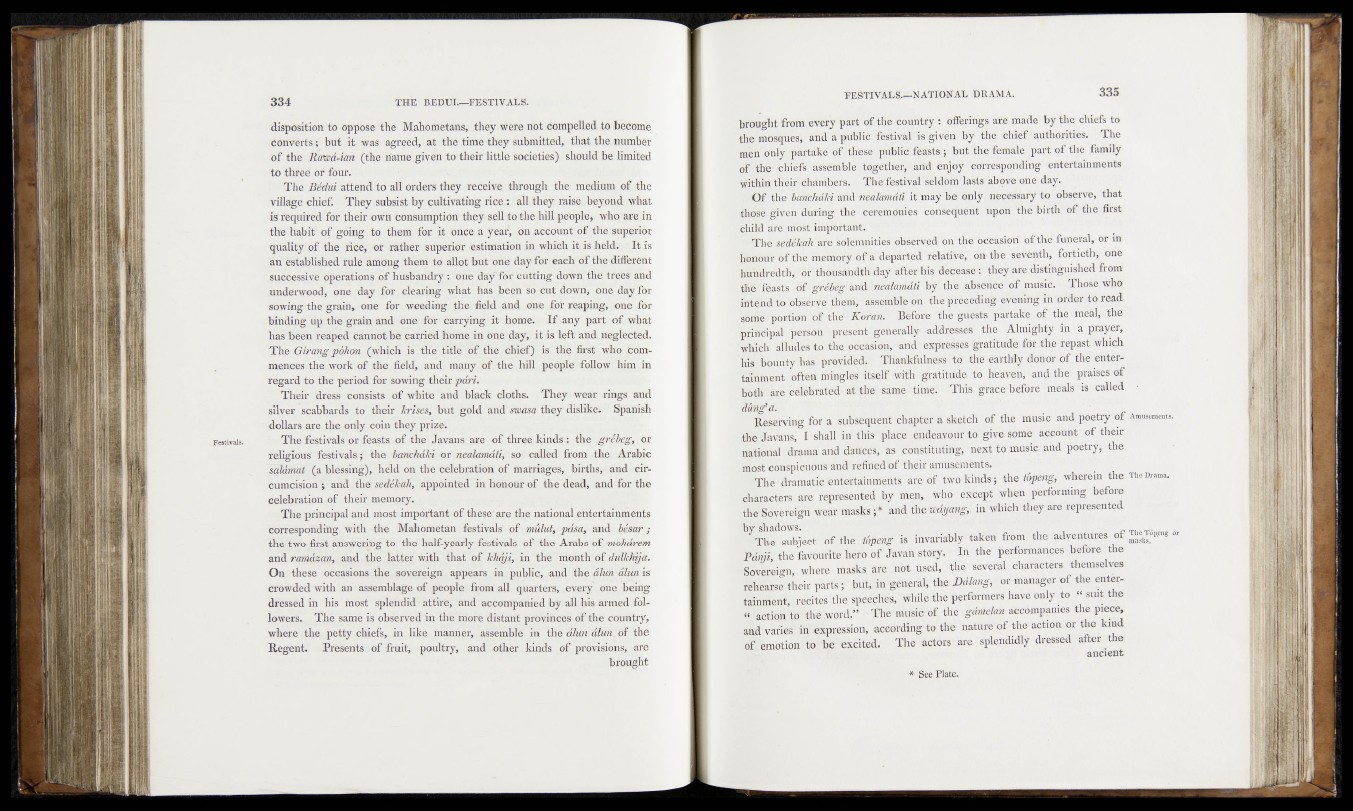
disposition to oppose ft# Mahometans* they were not compelled to become
Converts; but it was agreed, at fte time they submitted* that the number
•of the JRawd-ian (the n'atne given to their little societies) should be limited
•to ftrCebr four. >
The Bddm attend.to all orders they receive through the 'medium of the
village Ghief. They subsist by cultivating rice: all they raise , beyond, vfhat
is required for their own consumption they sell to the hill people, who are in
the habit>of going to them for it once.ayear, on.account of the superior
quality of the rice, or rather superior estimation in which it is held. .ft is
an established rul# among them to allot but one day for each of the1 different
successive operations of husbandry: “otte day’ftyramfig' down the tfeos: and
junderwood, one day for clearing what has been'sp cuf downj-one day.for
sowing the grain, one for weeding the field and one for reaping, oqe for
binding up the grain and one for carrying it home. If any part of what
has been reaped cannot be carried home in one day, it is left and neglected.
The Girang pdhon (which is the title /oiy the chief) is’ the first wtfq ,%0n-
mences the work of the field, and many of5 the^-lyll ^people, follow him in
regard to fte period for sowing their pari.
Their dress consists of white and black cloths. They wear rings and
silveF scabbards to their Ttrises, but gold and s'tiDasa they dislike. Spanish
dollars are the only coin they prize. ,
The festivals or feasts of the Javans are of three kinds: the g rPpgg^or
religious festivals; fte banchaki or nealamdti, so called from f t e , «Arabic
sdldmat (a blessing), held on the celebration of marriages, births, and •circumcision
and the sedeTeah, appointed in honour'of fte dead, and for the
celebration of their memory. •„
The principaland most important of these'are the national entertainments
corresponding with the Mahometan festivals of muliit, pdsa, and hesat'j
the two first answering to fte half-yearly festivals of fte Arabs d £ :mohdrem
and ramdzan, and the latter with that of Md/j, in the taorith o f dulfchija.
On these occasions, the sovereign appears in public, alid the dlunraliin is
crowded with an assemblage of people from all quarters, every ^pnp. being
dressed in his most splendid attire, and accompanied by all his armed followers.
The same is observed “in the more distant provinces of the country,
where the petty chiefs, in like manner, assembly in the dlun dluii.csfwie
Regent. Presents of fruit, poultry, and other kinds of provisions, are
brought
brought from/èfvirÿ' paptfof the ’ëoutltry : offerings are made by the chiefs to
the -mosqüés, and a pdbl)4 'festival 'rs^given by-the chief'authorities. The
men only'^rtàke of/thesè public'feasts ; but the female part of the family
of 'the‘‘chiefs asseniblè*-ftg^CTj?^nd jenjoÿ corresponding entertainments
withinthèîr’chambers. Th ë'ffsti^|il' 'seldÖhv‘lasts above one day.
. Of ^Êè-'baïïciïàld ■ën$itpÊidjhaiü^ it may be only necessary to observe, that
those gtvèriyduririg' the cereth'oriiës -con^quéh^ffpdii, the birth of the first
Child aire1 mosttimportaht.
Swfhë sefflhah are Solemnitîes^bsèfÿedWfhe occasion of the funeral, or in
hSriour of ithfe-memory-of h''àepartê'd relative,'tin the seventh, fortieth, one
hnhdredth/’ br ftousandtiid'ày’âftêr'his decease r they 'arddistinguished from
ft# feasts *of g^eftêgl^nû -neahmâti by’Jft#^Absence of music.1 'Those who
intend to Observe them/y assemblcM^^&he^ff'écellng eVëÊing in order to read
sfonlih'poftion-'of' fte' pittite fthe guests partake^of Jthe meal, the
principal ^l^^^pYesep^gcheraliy ' Addresses the in a prayer,
'which àlluties^o^e occasion, and eip'resW; gratitude for fte-repast which
Kii- bounty % as * provided. ■ T h an k fu ln ^to the earthly dönohof fte énter-
fàmtnent -often1 mingleiëi&self with' gratitude /to heavef$-4nd(thë praises of
both are ceïêfrratèd- at the3 same time. This gtâéè before-meals is called
d&ng,(M^ i , • y.- .n > ■■■-- --- + BSJSg " - ,r ,
- 'Reserving Subsequent chapter a sketch o f'fte music and poetry of Amusements
the^Javans, I'shall in this place endteavotfr to give some account of their
natitmal drama'and dA^ees, as cohstitutihg/'iiext'to music and -poetry,-the
most TOnspieüohs'and refined of their amusements.
The dramatic entertainments are of two kindly the iépeng, wherein the The Drama,
characters arc-represented by men, yfto except when performing before
thdSovereign wear masks ;* and the wdyang, in which they are represented
bv shadows. . . . . . .
'^T h è ' subject of the tbpeitg is invariably taken from the adventures of ma*ka.ORP g
Pdnji, the favourite1 hero of Javan story. ■ In the performances before the
Sovereign, where masks are not jjsed, the several characters themselves
rehearse iheir parts; ' butaan'1 general, the Ddiang, or- manager of the enter-
m m m m m M M B g &e performers have only to g 'suit fte
«. action to’kheiword.” The music of the 'gamelan accompanies the piece,
and varies1 in* expression, according to the nature of the action.or the kind
of emotion to be excited. The actors are splendidly dressed after the
* See Plate.